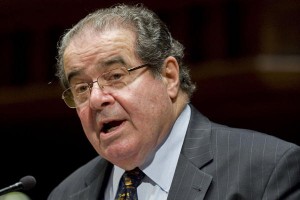 Justice Antonin Scalia, interviewed on Fox News, talking about the July 20, 2012, massacre Aurora, Colorado, said,
Justice Antonin Scalia, interviewed on Fox News, talking about the July 20, 2012, massacre Aurora, Colorado, said,
Obviously the amendment does not apply to arms that cannot be hand carried. It’s to ‘keep and bear’ so it doesn’t apply to cannons but I suppose there are hand-held rocket launchers that can bring down airplanes that will have to be decided…. My starting point and probably my ending point will be what limitations are within the understood limitations that society had at the time.
The segment can be watched here, on YouTube.
With the use of the word “limitations,” and the phrase “it doesn’t apply to cannons,” Justice Scalia appears to suggest that gun control is legitimate public policy, as suggested by me on this blog, here. However, the phrase “there are hand-held rocket launchers that can bring down airplanes that will have to be decided” raises questions in my mind. It seems to me that it’s self-evident that weapons of mass destruction, whether on wheels, like cannons, or portable, like hand-held rocket launchers, while useful to insurgents, constitute a public safety challenge.
It should also be noted that while the Second Amendment and the rest of the Bill of Rights were written in 1789, 223 years ago, and the US Constitution, ratified in 1787, was written 225 years ago; they were written to be relevant to the United States of America at that time and in the future; 200, even 300 years later. That is today, and for the forseeable and unforseeable future. Does Justice Scalia mean that the arms we are entitled to keep and bear are arms designed and built according to technology available in 1787? The NRA might disagree with that interpretation of the Second Amendment. With all due respect to Justice Scalia, we need to place limitations on the weapons that are available today, not only the limitations of the world of 1787.
Parenthetically, the “Understood limitations that society had at the time” might have called for a different decision in the Citizens United and Florence.
In the Citizens United decision, describe by me here, the Supreme Court, with Justice Scalia concurring, ruled that corporations have the right to free speech. According to Marjorie Kelly, in The Devine Right of Capital, Berrett Koehler, here, early views were that corporations were organized for a limited time and limited scope. They were not considered “people.”
In Florence v Burlington, describe by me here, the Supreme Court, with Justice Scalia concurring, ruled that officials may strip-search anyone arrested for any offense, however minor, before admitting them to jails even if the officials have no reason to suspect the presence of contraband. Mr. Florence was stopped for a traffic infraction and wrongly arrested because police incorrectly believed that he had not paid a fine. He was strip-searched on two separate occasions. The founders of the Republic believed that citizens are innocent until proven guilty.
Would Jefferson and other authors and signatories of the Constitution and Bill of Rights, if you put them in a time machine, brought them here, and asked them to review the Bill of Rights, say,
“We must regulate cannons, but not assault rifles with 100-round clips or hand-held rocket launchers capable of bringing down airplanes?”